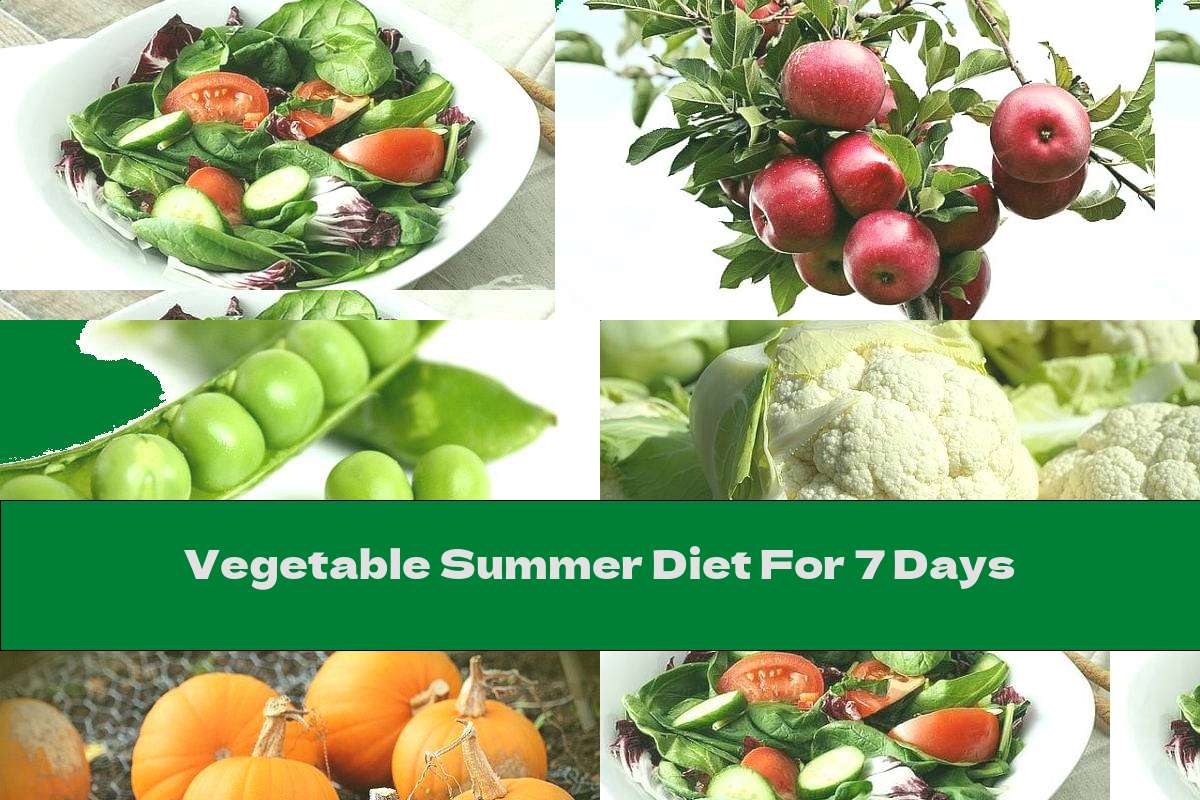Vegetable Summer Diet For 7 Days
 Author: Ivan Red Jr.
Time for reading: ~3
minutes
Last Updated:
August 08, 2022
Author: Ivan Red Jr.
Time for reading: ~3
minutes
Last Updated:
August 08, 2022

CHAPTERS (Table Of Contents)
In this article, learn more about Vegetable Summer Diet For 7 Days. Vegetable summer diet for 7 days.
We usually think about the slenderness of our figure at the beginning of the summer season. Then we hurry to undergo all sorts of diets, just to get in shape quickly and enjoy the worries of the scorching sun without worries. Sometimes the mission turns out to be impossible, which could be due to a number of factors. We will not comment on them now, but we will introduce you to a summer diet, in case you have not yet overcome the unnecessary weight.
The diet is aimed at the end of summer, given the products that are included as a main menu, because then there is an abundance of them around us. These are the different types of cabbage, tomatoes, eggplants and sweet peppers that are recommended, as well as any vegetables in general. In addition, various fruits are allowed for consumption, as well as intake of fresh milk 2 times a week.
| The apple is probably the first tree cultivated by man. |
The duration of the regime is seven days, and during this period it is possible to lose 7-8 kilograms. Of course, it is individual for each person, as the final result is influenced by the peculiarities of the organism and the way of life.
The menu is an example, on the basis of which you could compose your own version.
Vegetable diet menu:
- Breakfast: salad of fresh vegetables, but without the use of fat, and fruit;
- Breakfast: boiled cauliflower, a glass of tomato juice;
- Lunch: vegetable soup with peas , fruits;
- Afternoon snack: fruit salad (or a glass of milk, but only 2 times a week);
- Dinner: vegetable stew, fruit.
| Did you know that starch derived from peas is used in the production of modern organic plastics. Another interesting fact is that the ancient Chinese considered peas, not rice, as a symbol of wealth and fertility. |
The diet is well tolerated by most people, due to the variety it offers, in the face of the many vegetables and the ability to prepare different dishes from them. The products can be boiled, stewed, baked (including grilled, charcoal) or eaten raw.
|
Cauliflower is suitable for consumption during a weight loss diet, but it can also be eaten by people with diabetes. It is best absorbed by the body compared to other varieties of cabbage. |
If you are wondering exactly what vegetables to include in your menu, we will help you with the following list, in which we have listed some of the best weight loss helpers. You will also understand why.
Vegetables to help lose weight
- Cabbage is a favorite among vegetables that help lose weight, because the high content of cellulose in it satisfies hunger. In addition, consuming it, the body gets rid of toxins. Each variety of cabbage is suitable for weight loss, but it is worth betting mostly on white, colored and broccoli.
- The honorable second place is for crispy cucumbers. They have a lot of water and few calories.
- Tomatoes are third because they perfectly satiate and dull the feeling of hunger. Of particular respect is the tomato juice, which is often included in various diets.
- Next is the pumpkin, and the reason it is on our list is that it contains a rare substance that helps speed up metabolism. That is why losing weight with pumpkin is easy and without feeling hungry.
- Sweet peppers take the position after the pumpkin. They are rich in vitamins and nutrients, and even their aroma helps to lose weight, as it stimulates the body to produce substances that reduce weight.
| Pumpkin juice is a wonderful antioxidant. |
Remember that before undergoing any diet, it is recommended to consult a doctor familiar with the condition of the person wishing to lose weight, in order to avoid health risks in possible diseases and / or ailments.
Related Articles
- The Nutritional Value of Avocado Calories: Benefits, Diet Tips, and Recipes
- The Ultimate Guide to Diet ��� 7 for Improved Nutrition
- The Nutritional Value of Potato Chips: How They Fit Into a Healthy Diet
- Nutritional Benefits of Chowmein: A Healthy Addition to Your Diet
- The Ultimate Guide to a Healthy Diet: Benefits, Components, and Tips
Top Nutrition Articles Today
- . The Role of Hydrochloric Acid in Digestion: A Comprehensive...
- . Chicory: 15 Health Benefits, How To Drink, Contraindications...
- . The Latest Food Pyramid: A Guide to Balanced Nutrition
- . The Role of Hydrochloric Acid in Digestion: Importance, Symp...
- . Hydrochloric Acid in Digestion: Importance, Symptoms, and Na...
- . The Complete Guide to Fructose in Nutrition: Metabolism, Hea...
- . Carbs to Sugar Conversion Chart: Monitoring Carb and Sugar I...
- . The Role of K12 in Nutrition: Benefits, Sources, and Recomme...
- . Ammonium Bicarbonate: Uses, Benefits, and Recipes for Baking
- . Understanding Emulsifier 472 (E472a) in Nutrition: Functions...